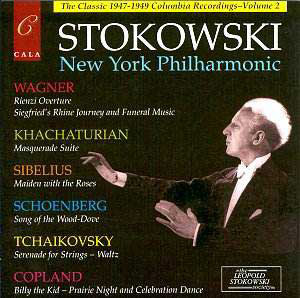This CD is a companion to Cala’s previous collection
of Stokowski’s 1940s recordings with the NYPO (Cala CACD0533) which
I recently reviewed enthusiastically
Like Volume 1 this collection opens with a Wagner overture,
in this case the overture to Rienzi. I found this to be a riveting
performance, by turns majestic and exciting. Stokowski is highly persuasive
in this piece and gets very distinguished playing from the orchestra.
There’s more Wagner in the form of two "bleeding chunks" from
Götterdämmerung. In both instances the excerpts played
here are somewhat more extensive than we are accustomed to hearing in
the concert hall for Stokowski reverts to the full score to include
substantial "lead-in" passages. The performance of the Funeral
Music (track 10) is as searing yet noble as any I’ve heard with immensely
powerful brass playing which is reported splendidly by the Columbia
recording. The ‘Rhine Journey’ (track 9) sounds here like an exuberant
tidal wave, exultantly sweeping all before it; truly, the Rhine in full
spate.
One of the earliest highlights of Stokowski’s studio
career was the 1932 premiere recording of Schoenberg’s colossal Gurrelieder,
made in Philadelphia. Here he gives us the celebrated ‘Song of the Wood
Dove’ in a reduced orchestration by Erwin Stein (though the orchestra
still sounds pretty full to me). The powerful and accomplished soloist
is Martha Lipton. She was a soloist at the Metropolitan Opera between
1944 and 1960 and this assumption of the role of the Wood Dove shows
that she had strong dramatic credentials. Stokowski directs the difficult
accompaniment accurately and sympathetically.
Stokowski gave the New York premiere of the Khachaturian
suite in October 1947. I wonder if this recording, which followed hot
on the heels of that premiere was the work’s first? The liner notes
quote a contemporary review of the recording which delivers the following
verdict: "As a lesson in how to take trite music and make it sound
actually great, this set is not only a lesson but a whole course for
aspiring conductors." I couldn’t agree more. Whatever one’s reservations
about the music per se, the opening waltz (which I rather like,
I must confess) is done with tremendous panache (track 3) and the succeeding
Nocturne is dominated by a most poetic solo by the NYPO’s long-serving
concertmaster, John Corigliano (father of the composer of the same name).
The Romance (track 6) is intense and passionate. In short, Stokowski
makes the best possible case for this music.
The shorter works are all well done. The brief Sibelius
excerpt (track 2) is hushed and tender. This maiden is a fragile flower
and is nurtured with great care and delicacy by Stokowski and his players.
The Tchaikovsky Waltz (track 8) is invested with spirit and romance,
though some may feel that the agogic hesitations are a trifle overcooked.
The two Copland items which end the collection have a suitable feel
of the Great Outdoors. Stokowski caresses ‘Prairie Night’ (track 12),
evoking most successfully an image of a vast, deep blue sky in which
the stars twinkle brightly.
As was the case with Volume 1, Richard Gates’ notes
are a model of their kind; succinct yet well written and informative.
The transfers are excellent. This CD is just as eminently recommendable
as was its predecessor. Cala have done ‘Stoki’ proud.
John Quinn

